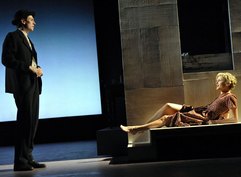SITE GUIDE
SEARCH
REVIEWS
REVIEW ARCHIVES
ADVERTISING AT CURTAINUP
FEATURES
NEWS
Etcetera and
Short Term Listings
LISTINGS
Broadway
Off-Broadway
NYC Restaurants
BOOKS and CDs
OTHER PLACES
Berkshires
London
California
New Jersey
DC
Connecticut
Philadelphia
Elsewhere
QUOTES
TKTS
PLAYWRIGHTS' ALBUMS
LETTERS TO EDITOR
FILM
LINKS
MISCELLANEOUS
Free Updates
Masthead
Writing for Us
A CurtainUp  London Review
London Review
 London Review
London ReviewDesire Under the Elms
|
if I could, in my dyin' hour, I'd set it afire an' watch it burn--this house an' every ear o' corn an' every tree down t' the last blade o' hay! I'd sit an' know it was all a-dying with me an' no one else'd ever own what was mine, what I'd made out o' nothin' with my own sweat 'n' blood! 'Ceptin' the cows. Them I'd turn free.
— Ephraim Cabot
|

Morgan Watkins as Eben and Denise Gough as Abbie (Photo: Keith Pattison) |
We learn early on that Peter (Fergus O’Donnell) and Simeon (Mikel Murfi) have a different mother to their younger and taller step brother Eben (Morgan Watkins). Peter and Simeon are like a comic double act with their yokel, almost Hillbilly-type ways, and lack of sophistication. Most O’Neill unlike. Upon the death of Eben’s mother they are counting the days until their 76 year old father’s death and their inheritance of the farm. Knowing where the pot of money is hidden, Eben persuades his brothers to sell him their future interest in the farm for $300 apiece.
Ian MacNeil’s beautiful individual rooms with the cramped family space are situated in separate wooden boxes with one room downstairs and the set spinning to give two bedrooms with steep eaves upstairs. James Farncombe has lit boxes of colour at the side, gold turning to green and then pinky red to convey the wonderful skies O’Neill describes in the text. Morgan Watkins who plays Eben is so tall that he is always bent over upstairs in the cramped house. A high path leads out through the auditorium across the left front of the stalls for people to stride in and out because this is a time when they walked from farmstead to farmstead. A lone musician plays evocatively.
The tenor of the plays changes dramatically when Ephraim (Finbar Lynch) arrives home with a new wife, half his age, Abbie (Denise Gough). The minute those two are on stage, it lights up with dramatic tension. Ephraim in formal wear of winter coat and high crowned felt hat cuts a beautiful silhouette as director and lighting designer give us glimpses of people in the distance as outlines against the sky. Abbie is laying claim to the house as she visits each room and counts her new possessions with excitement and self congratulation. For the brothers the new wife is an extra barrier between them and their inheritance. It is natural that Eben and Abbie might be attracted to each other given Ephraim’s advanced age and their courtship is believable.
The second act opens with great celebration at the birth of a baby to Abbie with everyone presuming Ephraim has achieved this at 76. The clog dancers are enthusiastic and fun with plenty of rural atmospherics. Tragedy rapidly follows this celebration as Abbie has fallen in love with Eben and would do anything to hang onto him, a vivid contrast with her attitude on arrival at the farmstead. The ending of the play is interesting, touching and redemptive with fine performances from the three members of the Cabot family. I can see that the great O’Neill plays, apart from Mourning Becomes Electra, were written more than twenty years after this one but I am convinced now that I should like to see more of the early plays with a director’s eye for the detail that Sean Holmes undoubtedly has.
|
Subscribe to our FREE email updates with a note from editor Elyse Sommer about additions to the website -- with main page hot links to the latest features posted at our numerous locations. To subscribe,
E-mail: esommer@curtainup.comesommer@curtainup.com
put SUBSCRIBE CURTAINUP EMAIL UPDATE in the subject line and your full name and email address in the body of the message -- if you can spare a minute, tell us how you came to CurtainUp and from what part of the country. |
| Desire Under the Elms
Written by Eugene O’Neill Directed by Sean Holmes Starring: Finbar Lynch, Denise Gough, Morgan Watkins With: Fergus O’Donnell, Mikel Murfi, Sandy Foster, Jason Baughan, Jim Creighton Designed by Ian MacNeil Lighting: James Farncombe Sound: Christopher Shutt Movement: Mikel Murfi Running time: Two hours 20 minutes with one interval Box Office: 020 8741 6850 Booking to 10th November 2012 Reviewed by Lizzie Loveridge based on 8th October 2012 performance at the Lyric Hammersmith, Lyric Square, King Street, London W6 0QL(Tube: Hammersmith) |
|
REVIEW FEEDBACK Highlight one of the responses below and click "copy" or"CTRL+C"
Paste the highlighted text into the subject line (CTRL+ V): Feel free to add detailed comments in the body of the email . . . also the names and emails of any friends to whom you'd like us to forward a copy of this review. |




